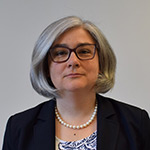Society and communities
Roadmap to accountability: Overcoming barriers to justice in Liberia (part two)
Overcoming barriers to post-conflict justice in Liberia, which has experienced two violent civil wars between 1989 and 2003 has been a key aspect of Professor Olympia Bekou’s work. In 2020, QR funding facilitated the delivery of the project ‘Roadmap to Accountability: Overcoming Barriers to Justice’ which built on previous research.
 Professor Olympia Bekou
Professor Olympia Bekou
Professor of Public International Law and Head of School
Delivered with the support of the School of Law’s Human Rights Law Centre and working in partnership with the Global Justice and Research Project (GJRP), the leading Liberian non-governmental organisation working on mass atrocity, the project has created discussion on the next stages of action. It has also deepened the previously existing links between Professor Bekou and GJRP, as well as other Liberian stakeholders from the legislature, Liberia National Bar Association and civil society.
The teams from Nottingham and Liberia worked collaboratively to deliver a project across two countries. This has brought new challenges amid the coronavirus pandemic, including the restrictions on travel for the Nottingham team. Accordingly, Professor Bekou and her research assistant remained within the United Kingdom, coordinating with GJRP to deliver training and wider project support remotely. The delivery of the project was made possible by the commitment of both teams throughout, operating remotely and maintaining regular communication.
Split into two phases, the project initially included a series of discussions gathering opinions from across Liberia conducted in February 2021. A total of 150 people were reached through five focus groups in five counties (Monrovia, Grand Bassa, Bomi, Bong and Lofa), discussed in Part One.
"By bringing together Liberians from across the country, the project has provided a significant networking opportunity in order to strengthen efforts for justice. "
The project moved into phase two in March 2021. Having sought the opinions of people from across the country, the project culminated in a historic two-day conference ‘Overcoming Barriers to Justice: the Roadmap to Accountability’. The conference was organised as a collaboration between the University of Nottingham, GJRP and their partner Civitas Maxima, a Swiss-based NGO. The conference took place over the 19-20 March and brought together representatives from the legislature, political parties, the Liberia National Bar Association, traditional community leaders, women and youth leaders and civil society in a collaborative effort to construct a Roadmap to Accountability. By bringing together Liberians from across the country, the project has provided a significant networking opportunity in order to strengthen efforts for justice.
Attendees at the conference confirmed those barriers which have so far prevented justice and their solutions. These include: a lack of political will to end impunity and implement justice, practical matters such as how would a War Crimes Court be funded, the need to increase public knowledge, and the need for collective action.
Necessary strategic actions to overcome barriers were also identified. These included the need to work collaboratively and deliver extensive outreach. The need to lobby politicians to support issues of justice and illustrating the importance of these issues for the electorate. One concrete next step was to translate important documents into local languages and ensure that all Liberians are able to participate in the quest for justice, including those who do not speak English. Another important next step is the need to gain support and funding in order to deliver some of the strategic actions, and for the anticipated War Crimes Court.
The barriers, along with key strategic actions, were combined into the ‘Roadmap to Accountability’, which provides clear guidance for stakeholders and important next steps. The Roadmap includes a ‘Pledge of Commitment’, which was signed by attendees on the second day of the conference as a symbolic representation of their dedication to seeking justice and accountability. The conference was reported in the national press and provided demonstrations of unity, with one traditional leader stating: “When we talk as chiefs and elders, we don’t talk like I’m from Nimba, I’m from Bong, we talk with one voice!”
Professor Olympia Bekou noted: “Liberians have suffered devastating conflicts and have yet to experience justice at home for atrocity crimes. I am heartened to see that the Roadmap to Accountability project has managed to bring together, for the first time, Liberians from all walks of life to debate the creation of a War Crimes Court and has acted as a catalyst for Liberian-led efforts to remove the obstacles that stand in the way of its establishment. The road to justice remains long, but the fight against impunity continues and the pursuit of justice has come a step closer”.
Written by:
Professor Olympia Bekou
Professor of Public International Law and Head of School
Professor Olympia Bekou is Professor of Public International Law and Head of the School of Law. She also heads the International Criminal Justice Unit of the University of Nottingham Human Rights Law Centre.
